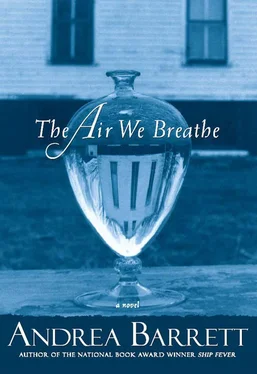Still pacing back and forth, wearing a suit cut like the previous week’s but brown instead of gray, he described in detail the process of freeing one particular specimen and encasing the blocks in plaster-and-burlap jackets. Twenty or thirty minutes into this, Naomi slipped off the window seat and went outside; three-quarters of us envied her, although Leo and Ephraim continued to listen. Afterwards, at dinner that night, more of us decided to drop out.
AT THE THIRD SESSION, on October 25, only six of us were present besides Miles and Naomi. A few minutes after the session started, we were joined by Eudora MacEachern, whom we knew then only as one of the ward maids. When she stepped inside the doorway, we learned from the way she smiled and the swiftness with which Naomi leapt from the ledge and moved to greet her that she was also Naomi’s friend.
While Miles spoke, Naomi and Eudora leaned against either side of the doorframe exchanging quiet comments and looking, Leo thought, like two animals similar in general health and sleekness but different in their natures: a hawk and a heron, say, or a coyote and a dog. Eudora — about twenty, he correctly guessed — stood on the left, tall and large-boned, strongly muscled but not at all fat, her light brown hair framing hazel eyes and pale skin that flushed easily. Leo had glimpsed her many times, when he and Ephraim went out to the porch for morning rest hours and she came in to make the beds and mop the floor, but in this context he finally saw more than the long blue cotton apron, the combs holding back her hair, and her chapped hands.
“My mistake,” Miles was saying as Leo examined the two young women. “I didn’t understand, at first, how little context most of you have for the work I’ve been describing. That was foolish of me. Let me try again.”
We turned, hoping for something to grasp, but soon learned that by “context” he didn’t mean anything to do with our lives. He meant history. The Megalosaurus, he said, had been discovered in 1824 by William Buckland, an Englishman who’d lived with his family among a menagerie that included a hyena and a dancing bear. Gideon Mantell, accompanied by his wife, had stumbled upon the Iguanodon, after which Richard Owen, examining those and other finds, invented the name for the order. In London, in 1854, Waterhouse Hawkins filled the Crystal Palace with models of those prehistoric creatures, also mounting in Philadelphia the first skeleton of the Hadrosaurus .
Twenty minutes, forty minutes, an hour. During the first two sessions, Miles had forgotten to take a break for our snack, even though food had been laid out invitingly. We’d been too timid to complain, then, but this time, with a smaller group, Ephraim rose early in the second hour and pointed at the laden table.
“Oh, of course,” Miles said, slightly flustered. “Let’s take ten minutes. Please enjoy your refreshments.”
We stood back while Miles poured a cup of hot chocolate and went over to the window, apparently drawn by the row of pigeons who’d settled along Hygeia’s shoulders and head, spacing themselves at intervals so precise they might have used a measuring tape. Except for Leo, the rest of us crowded around the food. Leo moved toward Miles to ask if he knew the work of the Russian paleontologist Vladimir Kovalevsky.
Miles’s face lit up. “Darwin’s Russian correspondent!” he said. “His work on fossil horses inspired Huxley. Such an interesting thinker. How do you know of him?”
“He studied in Odessa,” Leo said. “As did I, briefly. He’s still much discussed there, because of his influence on Dollo — do you know, in this country, about Dollo’s law?”
“Of course,” Miles said enthusiastically. “Here, we paraphrase it as: ‘No major evolutionary change is ever reversed.’ During the evolution of the hoof, the toe bones, once lost, don’t reappear.”
“The phrasing’s different in Russian,” Leo said, “but the meaning’s the same. What’s lost is gone for good.”
Miles looked at him thoughtfully and asked a few more questions. As he did, Leo grew more animated, pushing his fine dark hair away from his face. He was the first to take his seat, and when Miles began to speak again, returning to the subject of his own finds, Leo listened eagerly to his description of a giant creature with skull-frills of bone. He barely noticed the evening nurse who ducked inside the doorway and tapped Eudora on the arm.
THOSE BONES STICKING out like a ruff, Eudora thought as she followed the nurse down the hall. She’d never know, now, why a creature might have those sprouting from its skull. But this was the nature of her job as a ward maid: she was pulled constantly from one task to the next, never hearing the ends of conversations. Anyone — nurses, doctors, orderlies — could ask her for help, and everyone did. Without complaint she fetched files, retrieved lab results, made beds, damp-mopped floors, wiped down walls and furniture with a cloth wrung out in disinfectant. There were ward maids who hated those interruptions, but to her they felt as natural as her childhood.
Still she could remember the feel of watching from her crib as her older brothers and sisters swept into the kitchen, all four shouting and arguing before disappearing again, their mouths filled with something delicious their mother had made. Once she could walk, they’d treated her like a pet. Ernest might carry her off on his back, to serve as a lookout for one of his and Eugene’s games. Or Helen might dress her in Eugene’s cast-off clothes, blacken her eyebrows, tuck her hair under a cap, and declare her a tramp, only to have Sally remove the cap, tie her to a tree, and turn her into a princess awaiting rescue.
In a single day she might be used as a mascot in four different imaginary worlds, never completing a single game but delighted by so many adventures. When she grew tired, or when Eugene, who was very strong, accidentally grew too rough, she could retreat to her father’s taxidermy shop and hide among the drying animal skins, the knives and chisels and trays of glass eyes. Or she could run to her mother’s fragrant kitchen, where a beefsteak kept her eye from turning purple after she’d fallen into one of Sally’s traps. She’d grown so tall, she often thought, and gained such muscles in her arms and legs, from the effort of keeping up with her rowdy siblings. Later, when she started helping out at her Aunt Elizabeth’s cure cottage, she’d learned to divide her attention a dozen ways without diluting it. She liked her own swift adaptations to the constant change and the exhilaration of successfully juggling all the boarders and their requests.
Someday she’d find more ambitious work that made use of that adaptability. For now, though, this suited her fine. She chatted with everyone on her floors while carefully folding closed the brown paper bags pinned to our bedside stands, slipping them into the covered tins, and wheeling those to the incinerator out back. Picking up clean sheets and towels at the laundry and delivering the dirties was nothing; wheeling us to the laboratory or the X-ray facility, when the orderlies were overworked, she relished for the surprising confidences that emerged on these short journeys. She liked the pay envelope, too, and the chance to meet people from so many different backgrounds and places.
In fact she liked almost everything but the cleanup after what the nurses called “a situation.” Sometimes that meant a patient had died. Other times it was something like this: Raymond, sitting up to take his temperature and unexpectedly throwing an enormous hemorrhage. The nurse, easing Eudora into the now-empty room, said, “You’re so good at this,” as if the flattery would change the task. “No one else is as thorough as you are, and we’re shorthanded this evening.”
Читать дальше












